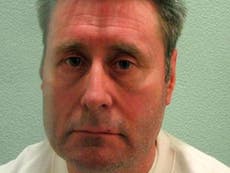Victims could sit in on parole hearings for attackers under new proposals after John Worboys scandal
Review will also consider increasing Parole Board's powers or replacing it with a tribunal
Victims could sit in on parole hearings deciding whether their attackers should be freed from prison in the wake of the John Worboys scandal.
Revelations that some victims of the “black cab rapist” found out he was to be released from jail sparked a legal challenge that saw him kept inside in 2018.
The scandal generated outrage over revelations that some women he targeted were not able to make representations to the Parole Board hearing that initially decided Worboys should be freed.
It sparked both the resignation of former Parole Board chair, Nick Hardwick, and moves to make it easier for both victims and prisoners to challenge the body’s decisions.
A package of new laws has also given the board greater responsibility for assessing terrorist prisoners, with the government moving to ensure all are reviewed rather than being released automatically.
Ministers have now announced a “root-and-branch review” to look at making further changes, including potentially abolishing the Parole Board and replacing it with a new type of public protection tribunal.
A public consultation was launched on Tuesday to ask for responses on proposed reforms, including whether the media and public should have greater access to the roughly 8,000 parole hearings held every year.
The review is looking at whether victims should be allowed to observe the hearings. Currently they are only allowed to read a statement about the impact of an offender’s crime.
Since May 2018, victims and the media have also been able to request summaries explaining the reasons for decisions.
The Ministry of Justice said the Parole Board often considers medical information and other sensitive information about prisoners, as well as going over graphic accounts of their past crimes that may be distressing.
Officials said they would consider whether prisoners may be less forthcoming in their answers to questions if hearings were held in public.
The review will consider if the status of the Parole Board needs to change, if it should have legislative powers to compel witnesses and enforce its decisions, and whether “alternatives such as a tribunal might deliver the parole function in a more efficient way”.
Justice minister Lucy Frazer QC said the review, which will report back next summer, built on other work to make the Parole Board’s work more transparent and easier to understand.
“We now have the opportunity to take a more fundamental look at the system to ensure it continues to protect people by releasing offenders only when it is safe to do so and does this in the most effective way,” she added.
Parole hearings are conducted by between one and three trained members, including judges and psychiatrists, who consider evidence and hears the opinions of probation officers and others who have been working with prisoners.
The panel then decides whether the risk a prisoner poses has reduced enough for them to be safely managed under licence conditions outside of prison.




